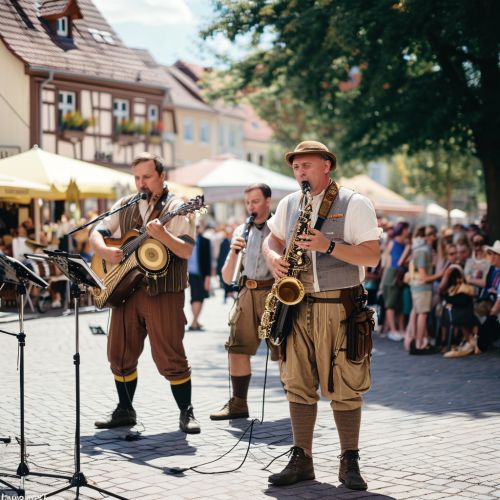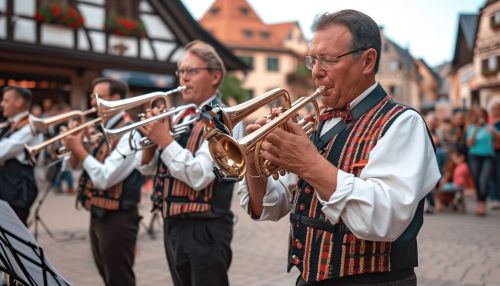Music of Germany
History
The music in Germany has a long and diverse history that dates back to monastic chants in the 9th century. Over the centuries, Germany has birthed numerous music genres, composers, and performers, and has been the home of significant developments in both classical and popular music.


Medieval Period
The earliest form of musical notation known to us today, neumatic notation, was developed in Germany during the 9th century. This system was used to notate Gregorian chants, the liturgical music of the Roman Catholic Church.
Renaissance and Baroque
The Renaissance period in Germany, which spanned the 14th to the 17th century, saw the development of polyphonic music. This style of music, characterized by the simultaneous combination of two or more melodic lines, was a significant departure from the monophonic Gregorian chants of the Medieval period.
The Baroque period, which followed the Renaissance, was a time of great musical innovation. This era saw the development of the fugue, a type of composition that utilizes a main theme (subject) and then introduces it in several voices. The fugue was mastered by German composer J.S. Bach, who is often considered one of the greatest composers in the history of Western classical music.
Classical and Romantic
The Classical period in Germany was dominated by the music of Mozart, Beethoven, and Schubert. These composers developed new musical forms, such as the symphony and the string quartet, and expanded the harmonic language of music.
The Romantic period, which spanned the late 18th to early 20th century, was characterized by an increased emphasis on emotion and individualism in music. This period saw the rise of programmatic music, which is music that is intended to evoke images or convey the impression of events. German composers, such as Wagner and Schumann, were leading figures during this period.
20th and 21st Century
The 20th and 21st centuries have seen a wide range of musical styles and genres in Germany. The country has been a leading force in the development of electronic music, with artists such as Kraftwerk pioneering the genre in the 1970s. Germany is also known for its heavy metal music, with bands like Rammstein gaining international fame.
Genres
Germany has a rich history of musical genres, ranging from classical to popular music.
Classical Music
Germany is renowned for its contributions to classical music. Many of the greatest composers in the history of Western music were German, including Bach, Beethoven, and Mozart.
Folk Music
Folk music in Germany is diverse, with each region having its own distinct folk traditions. These traditions often include dances, songs, and other forms of music that are passed down from generation to generation.
Popular Music
Germany has a vibrant popular music scene, with genres ranging from rock and pop to electronic music and heavy metal. The country has produced internationally successful artists in many of these genres.
Music Education
Music education in Germany is highly valued and is incorporated into the general education system. There are also numerous specialized music schools and conservatories for those wishing to pursue a professional career in music.
Music Festivals and Events
Germany hosts numerous music festivals and events throughout the year, catering to a wide range of musical tastes. These include the Bayreuth Festival, which focuses on the operas of Richard Wagner, and the Berlin Music Week, which showcases a variety of popular music genres.
